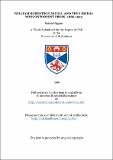William Robertson Nicoll and the Liberal Nonconformist press, 1886-1923
Abstract
William Robertson Nicoll (1851-1923) founded the British Weekly in 1886 to exploit the need for a Liberal Nonconformist newspaper. Nicoll became the most important editor of a Free Church journal in the Edwardian period. The British Weekly provided a regular focus for political Nonconformity and Nicoll was a primary raiser of the Nonconformist consciousness and shaper of the collective conscience. This thesis considers the role of newspapers as conduits of political thought. As distributors of information, newspapers had a definite role in setting the political agenda and this work considers the programme which Nicoll pressed at the British Weekly. The newspaper is also considered as a nexus of religious and financial considerations. The analysis provides an examination of the British Weekly from its foundation in 1885, placing it in political context and setting down the editorial agenda. Nonconformist concerns were threatened both by the political preponderance of Irish interests and by the extension of the franchise to working class voters more concerned with social than religious equality. This thesis therefore looks at Nicoll's alignment with the Liberal Imperialists because they would rid the party of its commitment to Home Rule and (less importantly) because they appeared to respond to the needs of the working class. In 1902 the British Weekly misplaced its national efficiency agenda and became prominent in the Passive Resistance campaign against the Education Act. The thesis examines the way in which the protest was used to energise political Nonconformity. The campaign brought Nicoll into contact with Lloyd George and this work explores the mutual benefits of this relationship and also the way in which Nicoll was compromised as a lobbyist by the association. This is the first comprehensive examination of the political nature of the British Weekly. It highlights the increasing complexity of reconciling religion and politics in the twentieth century as pressing social issues could not be repaired by Victorian moral crusades.
Type
Thesis, PhD Doctor of Philosophy
Collections
Items in the St Andrews Research Repository are protected by copyright, with all rights reserved, unless otherwise indicated.

